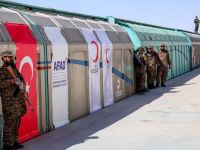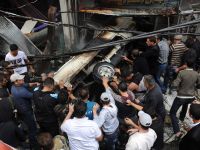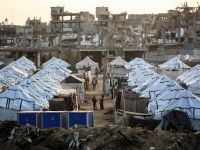Iraq has turned off the taps and decided to pull out the oil card ahead of a "comprehensive dialogue" with the United Nations on the decade-old sanctions regime.
Babel, Iraq's leading daily, warned Saturday that Baghdad would stick to its rejection of UN arms inspections, a year after UN Security Council resolution 1284 linked a suspension of sanctions to disarmament.
"Our readiness to break the ice in our strained relations with UN ... does not mean that we are giving up on our rejection of resolution 1284," said Babel, which is run by President Saddam Hussein's elder son, Uday.
On Friday, Iraq halted oil exports that are authorized under a UN humanitarian program for the country, which has been under sanctions ever since its 1990 invasion of Kuwait.
Baghdad has pinned the blamed for the move, which takes 2.3 million barrels per day off the world market, on the United Nations for rejecting its pricing formula for oil exports in December.
The United Nations said the formula was below a fair market price, as Baghdad was offering discounts to its clients to compensate for a 50 cent premium on the barrel price.
The surcharge would amount to a violation of the sanctions regime, as the sum would be paid directly to Baghdad, not to the UN-controlled escrow account for Iraqi oil export revenues.
"Iraq is determined not to abandon its rights" over the new pricing formula, the oil ministry said, calling for a dialogue "to make them (the UN) understand these truths."
Despite the halt, world oil prices ended the week lower, as the market shrugged off Iraq's decision, expecting Saudi Arabia to step in with extra volumes to make up for the shortfall.
US Energy Secretary Bill Richardson, meanwhile, said Washington would mobilize its strategic petroleum reserve if necessary, further easing market worries.
The latest showdown comes on the eve of the December 5 expiry of the current phase of the UN oil-for-food program, which in six-monthly phases authorizes Iraq to export crude in return for imports of essential goods.
Iraq now has a financial cushion to cover the break in exports.
An Iraqi oil export said Baghdad already had almost 12 billion dollars tied down in the escrow account "because of the policy of suspending and delaying contracts implemented by US and British representatives" on the sanctions committee.
Iraq's contracts with foreign suppliers are subject to the committee's approval.
On Friday, UN Secretary General Kofi Annan expressed "serious concern over the excessive number of holds placed on applications" by the committee, which had reached 2.31 billion dollars by the end of October.
"This is certainly one of the major factors that are impeding program delivery" in the government-controlled parts of Iraq, he wrote to the Council.
Annan and Iraq's UN ambassador, Said Hassan, have agreed to launch talks -- which Iraq has termed a comprehensive dialogue without preconditions -- at the start of next year, according to Annan spokesman Fred Eckhard.
Iraqi Deputy Prime Minister Tareq Aziz said Thursday, at the end of a visit to Moscow, that Baghdad was still categorically opposed to a resumption of UN weapons inspections.
But he added that Baghdad was mulling a proposal from Annan to discuss a possible return of arms inspectors, who were evacuated in December 1998 on the eve of a US-British air war on Iraq.
"Baghdad is studying such a proposal," Aziz said, adding that such negotiations would resume only "when it is convenient" for Baghdad – BAGHDAD (AFP)
© 2000 Al Bawaba (www.albawaba.com)







